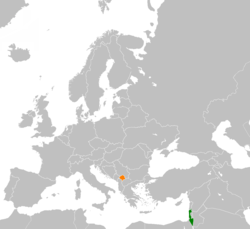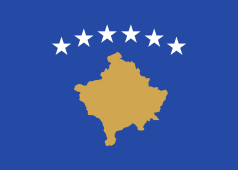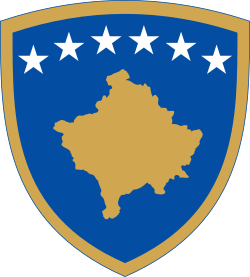Israel–Kosovo relations
Israel–Kosovo relations refer to bilateral relations between Israel and the Kosovo[a]. Although Kosovo declared its independence from Serbia on 17 February 2008, Israel has not recognised sovereign Kosovo, but in 2015, gave indications that its stance could change in the future.[1][2]
 | |
Israel |
Kosovo |
|---|---|
Country comparison
| Kosovo | Israel | |
|---|---|---|
| Flag |  |
 |
| Population | 1,920,079 (2017) | 8,904,280 (2018) |
| Area | 10,908 km2 (4,212 sq mi) | 20,770 km2 (8,019 sq mi) |
| Population density | 159/km2 (412/sq mi) | 403/km2 (1,044/sq mi) |
| Capital | Pristina | Jerusalem |
| Largest city | Pristina 204,725 (477,312 Metro) |
Jerusalem 901,302 (1,253,900 Metro) |
| Largest metro area | Pristina (477,312) | Tel Aviv-Yafo (3,854,000) |
| Government | Parliamentary republic | Parliamentary republic |
| First head of state | Mehmed Hoxha (de facto) Ibrahim Edhem Pasha (de jure) |
David Ben Gurion |
| Current head of state | Hashim Thaçi | Benjamin Netanyahu |
| Official language | Albanian and Serbian | Hebrew |
| Main religions | 88.64% Muslim 10.4% Christian 0.33% Other/None |
75.4% Jews 20.89% Muslim 7.8% others |
| Ethnic groups | 92.9% Albanians 1.6% Bosniaks 1.5% Serbs 1.1% Turks 0.9% Ashkali 0.6% Gorani 0.5% Romani |
75.4% Jews 20.6% Arab 4.1% others |
| GDP (nominal) | US$21 billion ($11,019 per capita) | US$305 billion ($38,004 per capita) |
| Military expenditures | $108.2 million (0.9% of GDP) | $23.2 billion (7.6% of GDP) |
| Military troops | 6,000 | 176,500 |
| English speakers | 49% | 85% |
| Labour forces | 483,200 | 4,198,000 |
Political relations
Israel was reluctant to recognise Kosovo's independence in part because an Israeli Foreign Ministry official already quoted by The Jerusalem Post said in February 2008: "We haven't decided when we're going to decide, and instead will monitor events and consider the issue." [3]
According to the Jewish Chronicle, Foreign Ministry officials and politicians were privately voicing a general sympathy towards the Kosovar cause, however, Israel would still not recognise Kosovo.[4] Knesset member Ruhama Avraham Balila said in February 2008 that "at present the government of Israel has made [the] decision not to join the group of countries which recognised the independence of Kosovo." She also said that Israel considers the situation "very disturbing."[5]
On 28 April 2009, Arthur Koll, the Israeli ambassador to Serbia, said that though it had been more than a year since Kosovo unilaterally declared independence, Israel had no intention of recognising the declaration, and that "Israel is asked from time to time how solid this decision is, but the fact is that Israel's position has not changed throughout this time. The Serbian people and government should appreciate Israel's position, which also demonstrates the friendship between the two states."[6][7]
On 16 September 2009, Israeli foreign minister Avigdor Lieberman said that Israel is "monitoring the situation between Serbia and Kosovo" and that Israel hopes for "a really comprehensive and peaceful solution" which would be established through negotiations between the two involved states. Lieberman also said that Israel would be able to withstand pressure to recognise Kosovo because Israel has "been under pressure since 1948 on many issues and we know how to deal with any pressure."[8] During a visit to Israel in late October 2009, Serbian Interior Minister Ivica Dačić, said that "Israeli officials have confirmed that Israel will remain firm in its stand [on Kosovo]."[9]
In June 2011, Lieberman said that Kosovo's independence is a "sensitive issue" and that Israel may recognise Kosovo after other countries like Greece and Spain accept it.[10]
In 2011, Serbia voted to recognize Palestine as UNESCO's 195th member, against Israel's wishes. Belgrade declared that it would not have opposed a resolution recognizing Palestinian sovereignty, had one come before the UN General Assembly.[11]
Notes
| a. | ^ Kosovo is the subject of a territorial dispute between the Republic of Kosovo and the Republic of Serbia. The Republic of Kosovo unilaterally declared independence on 17 February 2008, but Serbia continues to claim it as part of its own sovereign territory. The two governments began to normalise relations in 2013, as part of the 2013 Brussels Agreement. Kosovo is currently recognized as an independent state by 97 out of the 193 United Nations member states. In total, 112 UN member states recognized Kosovo at some point, of which 15 later withdrew their recognition. |
See also
References
- "Israel-Kosovo relations marked by shared sympathies, hampered by identity politics". J Post.
- "Kosovo leader addresses Israel Council on Foreign Relations". World Jewish Congress. Retrieved 25 February 2015.
- Israel won't recognize Kosovo, for now, The Jerusalem Post, 2008-02-19
- Israel breaks ranks on Kosovo Archived 17 July 2011 at the Wayback Machine, 2008-02-21, The Jewish Chronicle
- Израиль пока не намерен признавать независимость Косово, 2008-02-19, RIA Novosti (in Russian)
- "Israeli position on Kosovo firm" Archived 7 June 2011 at the Wayback Machine, B92.net, 2009-04-28
- Izrael ne menja stav o nezavisnosti Kosova, 2009-04-28, RTS (in Serbian)
- Press conference with FM Liberman in Belgrade, 2009-09-16, Israel Ministry of Foreign Affairs
- "Israel firm in refusing to recognize Kosovo" Archived 3 November 2009 at the Wayback Machine, B92, 2009-10-28
- Israeli will recognize Kosovo after Spain and Greece, says FM Archived 1 July 2011 at the Wayback Machine, AlbanianEconomy.com, 2011-06-28
- Adar Primor (13 March 2012). "Israel, between Serbia and Kosovo". Haaretz. Retrieved 18 March 2012.

